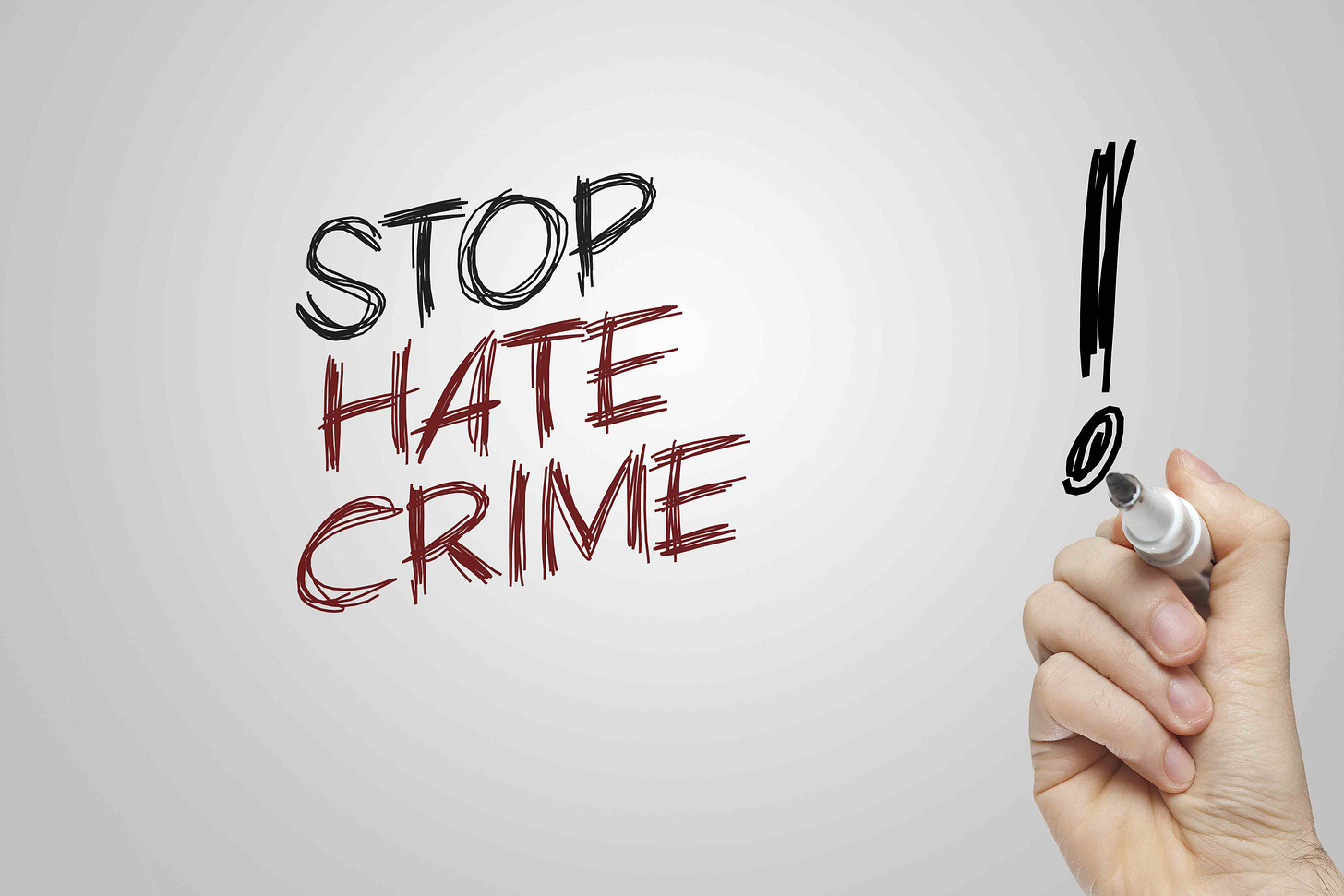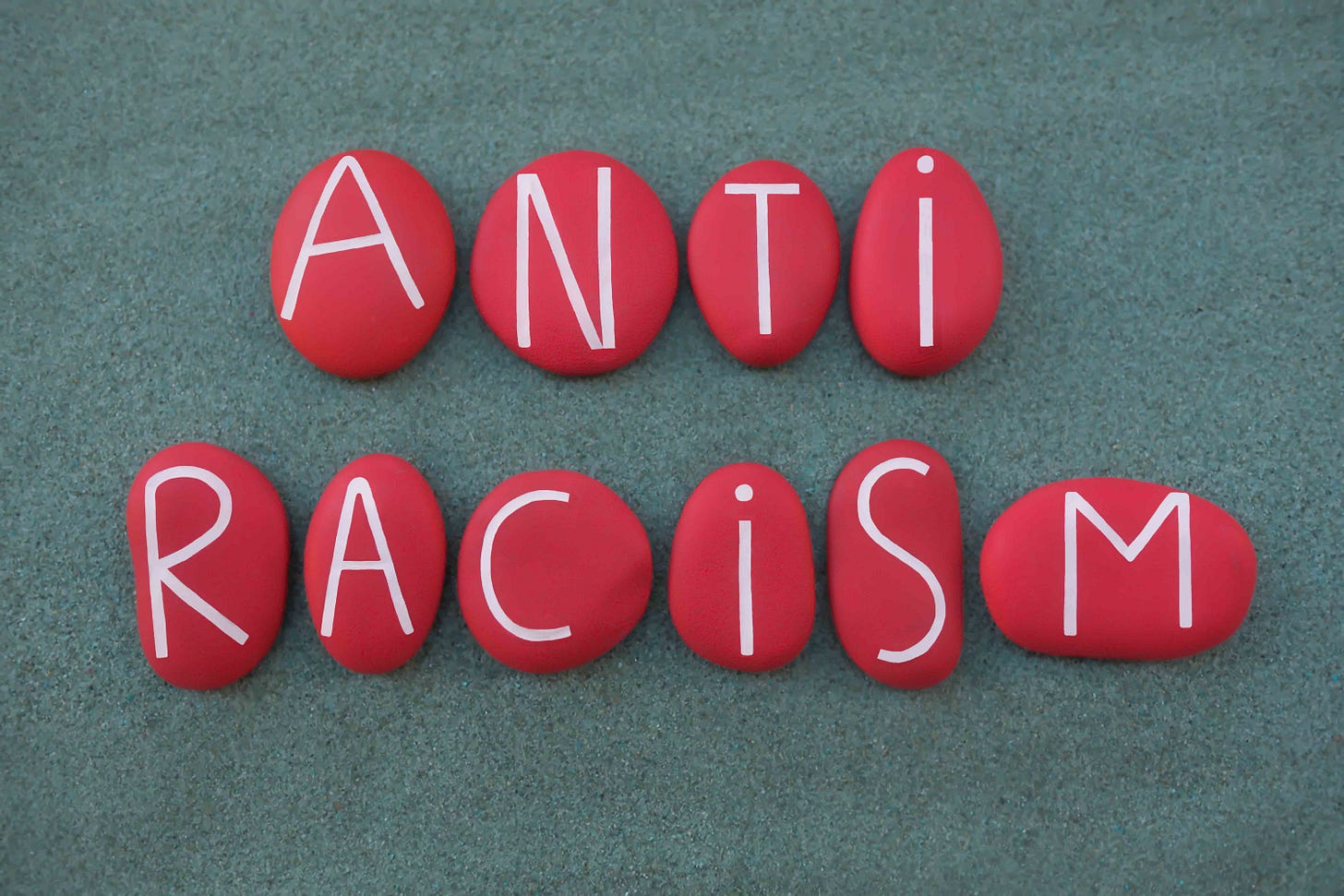E-Pluribus | July 27, 2021
A not-so-hateful hate crime, is antiracism really antiracist, and how should art that challenges our sensibilities be treated?
A round up of the latest and best writing and musings on the rise of illiberalism in the public discourse:
Conor Friedersdorf: The Hate-Crime Case in Which No One Was Intimidated
While respect for law enforcement is certainly a laudable objective, criminalizing speech or actions that express anger, disgust or even hatred of police hands too much power to the state to suppress dissent or even avoid accountability. Conor Friedersdorf writes at The Atlantic about one such incident in Utah where a woman was arrested under the state’s hate crime law for stomping on a “back the blue” sign.
Proponents of hate-crime legislation tend to assume that they will stigmatize or deter attacks on marginalized and vulnerable groups. But not all authorities with the power to enforce these laws share that vision. The Utah case is a stark reminder that laws intended to impede discrimination can be risky. They can enable government agents to subvert core civil-liberties protections by punishing or chilling speech that its armed enforcers dislike.
[…]
Gibson told the Daily Beast that the cop’s attitude toward her friend was too aggressive. Wanting to “stand up for” her friend, Gibson retrieved a pro-police sign that said back the blue, stomped on it as the deputy watched, and threw it in the trash. She claims her group had found the sign on the side of the road and kept it. The deputy alleged that she had stolen the sign from a local display.
[…]
Gibson was booked with criminal mischief and disorderly conduct. According to the local ABC affiliate, the arresting document stated that she was “smirking in an intimidating manner” and that “due to the demeanor displayed by Gibson in attempts to intimidate law enforcement” while destroying the sign, the charges are subject to a sentencing enhancement—that is, if convicted, she will be subject to a harsher punishment. Garfield County’s account raises obvious questions: While Gibson might have disrespected the sheriff’s deputy unjustly, how feeble must a cop be to feel intimidated by a teenager smirking or stomping on a sign? Does the county really need to “heal” from the incident?
Indeed, it’s possible that—unless the sign was stolen—no crime was committed at all. Even if Gibson’s conduct was disorderly under the letter of the law, a prudent cop or prosecutor would de-escalate this case rather than spend taxpayer time and money on criminal charges. The case has all the hallmarks of a needless attempt to punish “contempt of cop.”
Read it all at The Atlantic.
Eric Levitz: How Anti-Racist Is Anti-Racism?
Not one to be mistaken for a conservative, Eric Levitz writing for The Intelligencer at New York Magazine finds a number of problems with Ibram X. Kendi’s theories on “antiracism,” and Levitz is by no means nitpicking (at one point he questions Kendi’s commitment to “intellectual coherence”). Kendi’s reliance on group identity, statistics on inequality, and contradictory formulations lead Levitz to question how “anti-racist” Kendi’s anti-racism is.
Ibram X. Kendi’s work takes dead aim at those convenient fictions. The historian and pop-theoretician of “antiracism” seeks to disrupt white America’s complacency about racial progress by spotlighting Black-white disparities in incarceration, wealth, and other social ills. And he seeks to stigmatize victim-blaming accounts of Black social disadvantage by insisting that all racial disparities derive from a history of white supremacy (not a “culture of poverty”). Kendi is especially concerned with the way superficially non-racist ideas and policies can serve the function of fortifying racial hierarchy. His solution is to adopt a consequentialist definition of racism: A policy or idea is racist to the extent that it “produces or sustains racial inequity,” and antiracist to the extent that it reduces the same.
[…]
My own concerns about antiracism are (at least) threefold:
• In insisting upon the ongoing relevance of racial hierarchy to social life, antiracism can sometimes stray into reinforcing the very invidious, fictional group identities that undergird such hierarchy.
• While valuable for illuminating the scale of Black disadvantage, racial-disparity statistics can promote misunderstandings of social problems by eliding class distinctions within racial groups. Thus, when such stats are presented in the absence of an intersectional class analysis (as is generally the case in mainstream media), they may foreclose potential openings for interracial solidarity.
• In Kendi’s formulation, antiracist theory suffers from some glaring internal contradictions.
[…]
Encouraging light-skinned Americans to be more conscious of their white identity as a source of unearned advantage may redound to progressive ends (although this is far from clear). Encouraging them to see white identity as a source of communal belonging and solidarity, however, seems antithetical to antiracism.
Read it all at New York Magazine.
Amna Khalid, Booksmart Studios: Whitewashing History?
A relatively new Substack publication, Booksmart Studios, has launched a new podcast featuring Amna Khalid, associate professor in Carleton College’s history department. Entitled “Banished,” the podcast is billed as a “reassessment of the many people, ideas, objects and even works of art that conflict with modern sensibilities.” Episode One of Banished tells the tale of a series of frescoes featuring George Washington painted on the walls of San Francisco’s George Washington High School that have generated a fair amount of controversy. The story is presented in an evenhanded way, the narration is compelling, and the production values are excellent.
Listen to the whole podcast here.
Around Twitter
Proponents of Critical Race Theory (CRT) seem to spend more time talking about what they say it isn’t than what it influences or the impact it has on public policy and education:
Ben Shapiro with a sentiment we try to reflect here at Pluribus:
Via Heterodox Academy and Reason, Ken White (popularly known as Popehat on Twitter) and Greg Lukianoff discuss cancel culture:












